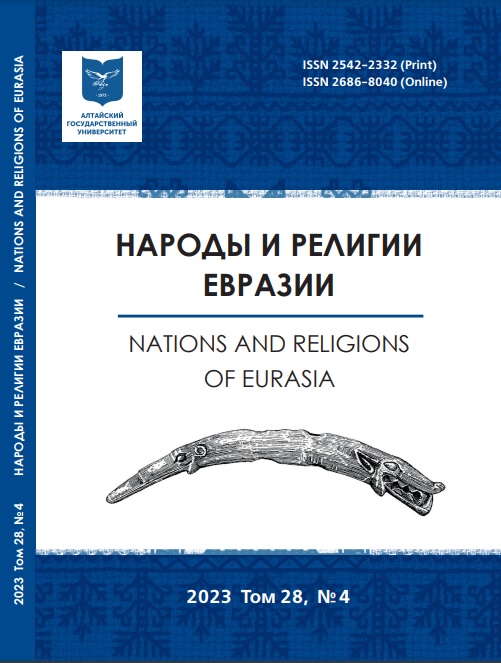The concept of good in the abrahamic religions in the context of social service
Main Article Content
Abstract
The article discusses one of the fundamental provisions of the Abrahamic religious systems related to moral and ethical issues in the relationship between believers and implemented by them in accordance with the settings of the sacred texts of the religions of revelation. The features of the interpretation of the concept of “good” in Islam, Christianity, and Judaism are presented. Within the framework of their social doctrines, its content and social significance are shown through the prism of social service.
The sacred texts of Islam, Christianity, and Judaism are considered. Various contexts of mentioning the good are analyzed. The comments of theologians, whose subject of interest is the concept of good as a fundamental basis for the concept of social service in the Abrahamic religions, are given.
The theological foundations for the charitable activities of the social institutions of Islam, Christianity, and Judaism are demonstrated, the possibilities of their interfaith cooperation on the social platform are revealed. The process of transformation of the concept of good in the context of social service in connection with digitalization and the transition of society to the information stage of development is being studied. The prerequisites for the emergence of various meanings and additional contexts that are inherent in good as a term in the philosophy of charity are highlighted.
Downloads
Metrics
Article Details

This work is licensed under a Creative Commons Attribution 4.0 International License.
References
Аз-Зубайди, Мухтасар Сахих аль-Бухари. Алматы : ТКэусар-саяхат, 2013. 609 с.
Баева Л. В. Классические христианские ценности с позиции современной экзистенциальной антропологии // Государство, религия, церковь в России и за рубежом. 2007. № 3. С. 78-80.
Библия: Книги Священного Писания Ветхого и Нового Завета: в русском переводе с параллельными местами. М. : Библейское общество, 1995. 1376 с.
Бирюлина Т. В. Вера Авраама как тема диалога авраамических религий // Исламоведение. 2011. № 3. С. 14-15.
Бобырева Е. В., Дмитриева О. А. Сравнительная характеристика ценностных ориентиров христианства и буддизма // СИСП. 2021. № 4. С. 568-583.
Ванюкова И. А. Влияние религиозных ценностей на экономику и её развитие // Современные научные исследования и инновации. 2015. № 6, ч. 4. С. 27-29.
Верующие разных религий — вместе в деле благотворительности // Институт религии и политики. URL: https://irp. news/verujushhie-raznyh-religij-vmeste-v-dele-blagotvoritelnosti/ (дата обращения: 18.04.2023).
Даудов Р. Х. Специфика исламской философии // Гуманитарные, социально-экономические и общественные науки. 2014. № 12-1. С. 4-6.
Дудорова А. С. Отражение феномена киберрелигиозности в практике мировых религий // Молодой ученый. 2020. № 4 (294). С. 341-343.
Кафаров Т. Э. Принципы этики ислама: нравственный ориентир для мусульманина // Исламоведение. 2010. № 2. С. 72-74.
Коран / перевод И. Ю. Крачковского. М. : Наука, 1990. 831 с.
Коркина А. В. Проявление благодати в еврейской библии: аспект заветов // World science. 2016. № 6 (10). С. 47-48.
Липов В. В. Религиозные ценности как фактор зависимости от предшествующего развития и формирования социально-экономических моделей // Пространство экономики. 2005. № 3. С. 68-69.
Мельник С. В. Межрелигиозный диалог: типологизация, методология, формы реализации. М. : ИНИОН РАН, 2022. 398 с.
Мунгалов В. Н. Мировоззренческие различия буддизма и авраамических религий // Психология в экономике и управлении. 2014. № 1. С. 144-148.
Смирнов А. В. «Благо» и «Зло» в исламской традиции и философии (к постановке вопроса) // Этическая мысль. 2008. № 8. С. 155-156.
Тимохина Н. И. Особенности коммуникации благотворительных организаций в социальных сетях // Молодой ученый. 2019. № 12 (250). С. 241-244.
Фатхуллин Р. А. Единый вектор социальной направленности христианства и ислама // Известия Иркутского государственного университета. Серия: Политология. Религиоведение. 2022. Т. 40. С. 121-122.
Чеснова Е. Н. Специфика цифровизации ислама и it-халяль // Исламоведение. 2022. № 3 (53). С. 26-41.
Armando Salvatore, Dale F. Eickelman Public islam and the common good. 2004. P. 134 (на англ. яз).
David Hollenbach, S. J. The common good and christian ethics. 2002, рр. 66-67 (на англ. яз).
Eliot N. Dorf To Do the Right and the Good, a jewish approach to modern socail ethics. 2004, рр. 200-203 (на англ. яз).
Kearney J. From Intra-Religious to Interreligious Dialogue. 2018. P. 40-47 (на англ. яз).
Moussa M. The Use of the Internet by Islamic Social Movements in Collective Action: The Case of Justice and Charity. 2017, рр. 100-104 (на англ. яз).

